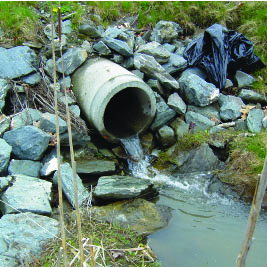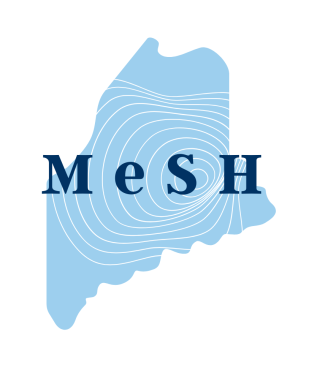Stormwater Management Program
UMaine’s stormwater management program works to protect surface and groundwater from the impacts of construction projects, facility maintenance, and waste management activities. UMaine is committed to utilizing best management practices to protect stormwater from hazardous materials and waste, as well as maintaining drainage ponds and swales to ensure the best possible protection of resources. There are various links and resources related to stormwater management, stream cleanup projects, pollution prevention, and best management practices on the OFM website. For more information about UMaine’s Stormwater Management Program, please contact Jodi Munster at 207-581-2720 or jodi.munster@maine.edu.
 Submit a Stormwater Incident Report
Submit a Stormwater Incident Report
There is also a form to submit a Stormwater Incident Report if you witness any form of waste or material dumping. You should report any pollution events, chemical spills, discolored water, or debris migration from a disturbed site. A report can also be made by calling the Office of Facilities Management at 207-581-4400. There will be a follow up on any report.
What is Stormwater and How Does it Become Polluted?
Stormwater is water from rain or snowmelt that runs off into water bodies and wetlands rather than soaking into the ground. It flows from developed areas (especially those with many impervious surfaces) such as rooftops, paved areas, bare soil, and across lawns while picking up soil particles, pet waste, salt, pesticides, fertilizers, oil and grease, trash, debris, and other pollutants. Stormwater runoff generally drains into bodies of water and wetlands untreated.
Impacts of Stormwater Pollution
The quality of stormwater runoff is influenced by the season, local weather patterns, geography, the surfaces it runs across, and the activities occurring on the flow path. Polluted runoff damages freshwater systems and damages aquatic habitat and plant life. Nutrients such as phosphorus and nitrogen contribute to eutrophication, the overgrowth of algae and depletion of oxygen which is harmful to aquatic life. Toxic chemicals from automobiles, sediment from construction activities, and careless application of pesticides, herbicides, and fertilizers are also damaging to the health of water bodies. Bacteria from pet waste and sewage can make nearby bodies of water unsafe for recreation.
Stormwater Management Program Attitude Survey
There is a Stormwater Management Program Attitude Survey related to general knowledge, regulations, and UMaine stormwater systems located on the OFM website. This survey exists to gauge general knowledge on the subject and inform public education campaigns to ensure that outreach is as helpful and effective as possible.
 Preventing Stormwater Pollution
Preventing Stormwater Pollution
An inventory conducted by the EPA showed that half of impaired waterways are affected by urban/suburban and construction related sources of stormwater runoff. Both large developers and individual homeowners can help reduce the impact of stormwater runoff. UMaine maintains a MEDEP Municipal Separate Storm Sewer System (MS4) general permit that allows the discharge of stormwater into the Stillwater and Penobscot Rivers, as well as adjacent MS4s. UMaine’s stormwater management program protects surface and groundwater from being damaged by construction, facility maintenance, and waste management activities. UMaine must take steps to investigate and eliminate any non-stormwater discharges from the stormwater system. There are also many education efforts related to proper stormwater management strategies.

